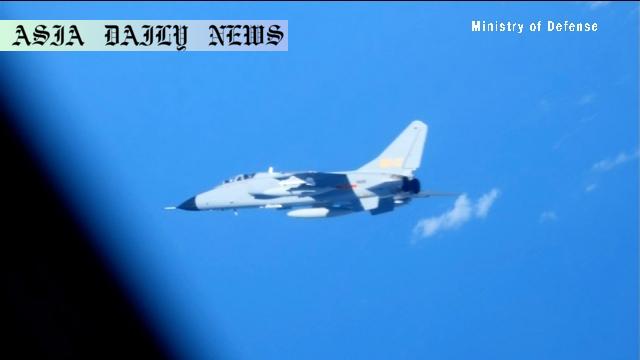East China Sea: Beijing defends Chinese military’s actions against Japanese reconnaissance efforts, blames Japan for risk escalation.
East China Sea: China’s defense spokesman defends military actions.
Japanese aircraft blamed for escalating maritime security risks.
Japan states Chinese military operated too close to its aircraft.

Tensions Escalate in the East China Sea
The maritime territories and airspace over the East China Sea have long been hotspots for geopolitical disputes. In the latest development, a Chinese defense ministry spokesperson has come forward to justify the behavior of Chinese military aircraft in incidents that Japan labeled as dangerously close encounters. According to the Japanese government, these incidents occurred over the high seas in the East China Sea on consecutive days earlier this week. The spokesperson clarified that the actions were part of China’s lawful right to safeguard its territory and monitor external military activities within its Air Defense Identification Zone (ADIZ). While Japan insists it was an unjust confrontation, China affirms that its aircraft were responding to frequent close-in surveillance maneuvers on the part of Japan. This new series of incidents highlights the broader issue of unresolved tensions that continuously place the two Asian powerhouses at odds.
China Defends Its Stand
Beijing maintains that its actions were a measured response to provocations. The defense ministry spokesperson emphasized that Japan must take accountability for initiating what Beijing perceives as harassment and reconnaissance missions too close to its borders. From China’s perspective, such intrusions pose a serious risk to regional stability and security. Their response, the official stated, adhered strictly to international law and principles of self-defense and national security. Japan’s reconnaissance activities, which often occur in China’s ADIZ, have been a long-standing complaint from Beijing. In China’s view, these reconnaissance efforts go beyond intelligence gathering and verge into hostile activity, necessitating counter-measures. By defending their actions, the spokesperson also deflected blame onto Japan for any perceived escalation in the skies and high seas of the East China Sea region.
Japan’s Perspective: Call for Restraint
Meanwhile, Japan has expressed grave concerns about what it considers China’s increasingly aggressive behavior. Japanese Defense Minister Takeshi Iwaya articulated Japan’s stance during a meeting with Chinese Foreign Minister Wang Yi. According to Tokyo, movements such as the ones observed recently disrupt peace and create an unnecessarily hazardous environment in the maritime and air domains. Japan asserts its military conducts operations within international law, maintaining that all maneuvers respect international waters and airspace regulations. However, Japan’s appeals for mutual restraint have not fostered tangible progress in bilateral relations. Instead, they have underscored the stark contrasts in how the two nations interpret freedom of navigation and airspace integrity under international law.
The Role of Regional and International Dynamics
This growing unease in the East China Sea transcends bilateral implications, shaping broader dialogues in the international realm. Both China and Japan occupy positions of influence in the global economic and political landscapes, meaning their disputes inevitably attract international attention and require scrutiny. Recurring clashes hint at deeply rooted issues that center around territorial sovereignty claims, historical grievances, and maritime dominance. As the East China Sea becomes increasingly militarized—primarily due to escalating presence from both nations—there are concerns this might destabilize the region, impacting trade routes and socio-economic stability.
Calls for Dialogue Amidst Escalation
The East China Sea remains one of the critical regions demanding diplomatic attention. While Japan has lodged formal protests over these aerial encounters, China persists in justifying its actions as necessary for its security framework. Dialogues remain an urgent need, though considerable trust deficits complicate the dialogue process. It is, therefore, imperative for related stakeholders, including international organizations and nearby nations, to mediate and prevent further military confrontations. Any large-scale clash between these two military powers could have ripple effects, effectively destabilizing East Asia as a whole.
Commentary
Understanding the Broader Context
The rising tensions between China and Japan over the East China Sea are emblematic of deep-rooted issues that extend beyond just military encounters. Historical grievances, territorial disputes, and competing visions for regional dominance underpin many of these disagreements. It is no secret that the East China Sea region holds immense strategic and economic value. The increased militarization seen in this region over the years intensifies the potential for conflict, drawing in scrutiny and concern from regional neighbors and the global community alike.
Impacts on Bilateral Relations
Military confrontations of this nature not only create immediate threats but also erode trust between the two nations. Both China and Japan play crucial roles on the global stage and have interconnected economic ties that make prolonged disputes counterproductive. Whether intentional or not, such incidents chip away at diplomatic efforts to stabilize relations and instead generate narratives of mistrust that stall collaborative initiatives. Moreover, these rising tensions could fan the flames of nationalism within both nations, making it increasingly difficult for any administration to adopt moderate or reconciliatory stances in the eyes of their domestic audiences.
Why Global Attention is Crucial
The ongoing situation presents lessons and concerns for the global community. For one, it underscores the fragility of peace in regions where territorial disputes intersect with major global trade routes and geostrategic interests. Any prolonged instability here could have ripple effects on global commerce, maritime policies, and even broader military alliances in the Asia-Pacific. The involvement of external stakeholders, whether through mediation or deterrence, could be an essential component in preventing further deterioration. However, this must be approached carefully to avoid further aggravating an already volatile situation.


